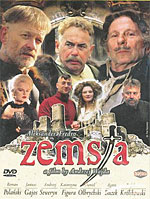 I’d been meaning to watch The Revenge (Zemsta, 2002) for ages – it’s Andrzej Wajda’s last completed feature prior to this year’s Katyń – and after other plans fell through last night I gave it a go. It’s a mixed bag: on the one hand, it’s hugely entertaining seeing two great directors clearly letting their hair down and having a ball (Roman Polański being the other – he’s playing the lead role), and as a farcical costume romp it worked very well.
I’d been meaning to watch The Revenge (Zemsta, 2002) for ages – it’s Andrzej Wajda’s last completed feature prior to this year’s Katyń – and after other plans fell through last night I gave it a go. It’s a mixed bag: on the one hand, it’s hugely entertaining seeing two great directors clearly letting their hair down and having a ball (Roman Polański being the other – he’s playing the lead role), and as a farcical costume romp it worked very well.
The basic situation, sourced from Alexander Fredro’s 1834 play (previously filmed by Antoni Bohdziewicz in 1956) is that two halves of the same crumbling castle are occupied by deadly rivals Cześnik Raptusiewicz (Janusz Gajos) and Rejent Milczeka (Andrzej Seweryn). As is often the way with costume farces, Cześnik’s niece Klara (Agata Buzek) and Rejent’s son Wacław (Rafał Królikowski) are madly in love with each other, but have to meet clandestinely to avoid enraging their elders – and Cześnik is similarly enamoured of the Widow Hanna (Katarzyna Figura). And when the Rejent finds out, he resolves to marry Wacław off to Hanna to upset everybody’s plans. Unfortunately, there’s a wild card in the form of Papkin (Polański), a dwarfish braggart who manages to create the impression that his influence and charisma are far greater than they actually are, and is consequently hired to carry out tasks that prove way beyond his abilities.
So far so genuinely amusing (Polański in particular seems to be having a whale of a time, as does an almost unrecognisable Daniel Olbrychski as Cześnik’s idiot manservant Dyndalski), but English-speaking viewers have a major stumbling-block with Vanguard Cinema’s DVD (R1 NTSC). There’s nothing wrong with the transfer (anamorphic picture, Dolby 5.1 surround), but the English subtitles only seem to translate for content rather than style – and while my ear for Polish is all but nonexistent, it was clear even to me that a lot of wordplay was simply being passed over. For starters, the dialogue is in verse, and while I appreciate that English verse translations pose a major challenge, it has been attempted in the past, most famously in the Anthony Burgess-sourced subtitles for Jean-Paul Rappeneau’s Cyrano de Bergerac and also the Russian Cinema Council’s edition of Alexander Ptushko’s Pushkin-derived The Tale of Tsar Saltan. As it stands, though, the effect is not unlike watching a Shakespeare comedy with all the puns and poetry removed, thus depriving me of what Polish critics claim is a major part of the play’s appeal.
Janina Falkowska has written about the film in much more cultural and contextual detail for Kinokultura, and passages like this one:
The dialogue is delivered brilliantly by the exceptional cast carefully gathered by Wajda for the film, making the complex script dazzle with humor and wit; the words written almost two centuries ago by Alexander Fredro nonetheless stand out as a warning to present generations of Poles. Even the exquisite players of secondary roles, such as Daniel Olbrychski (Dyndalski), provide a veritable firecracker of verbal attacks and counterattacks filled with political and sexual innuendo.
…show the kind of thing that I missed.